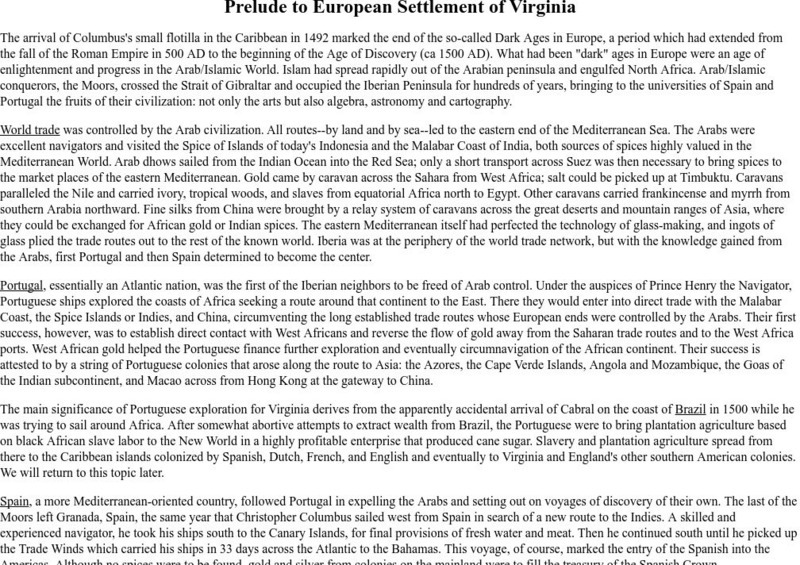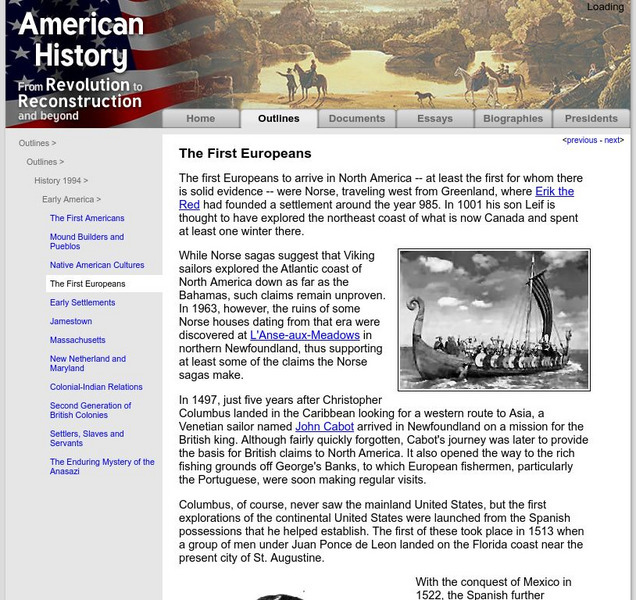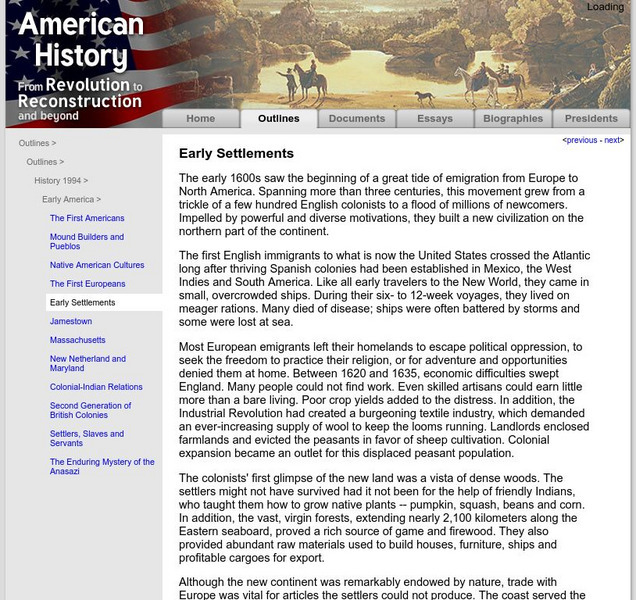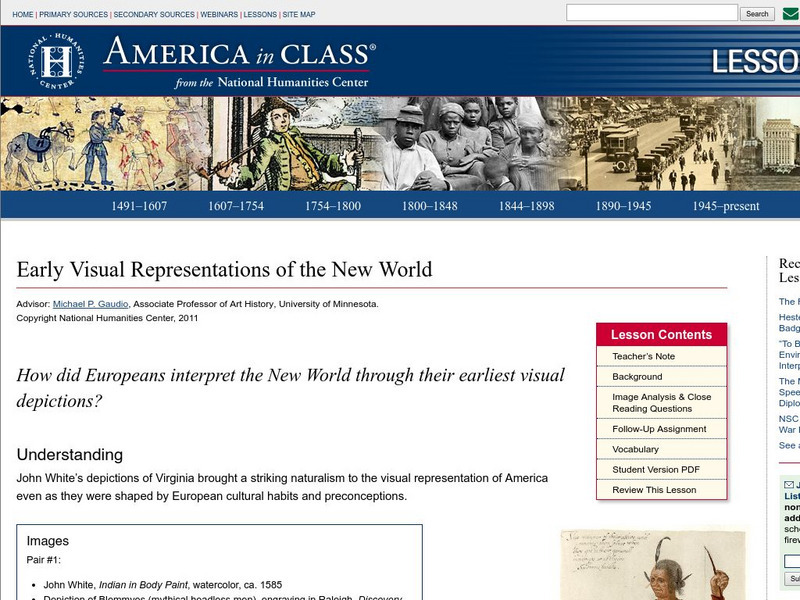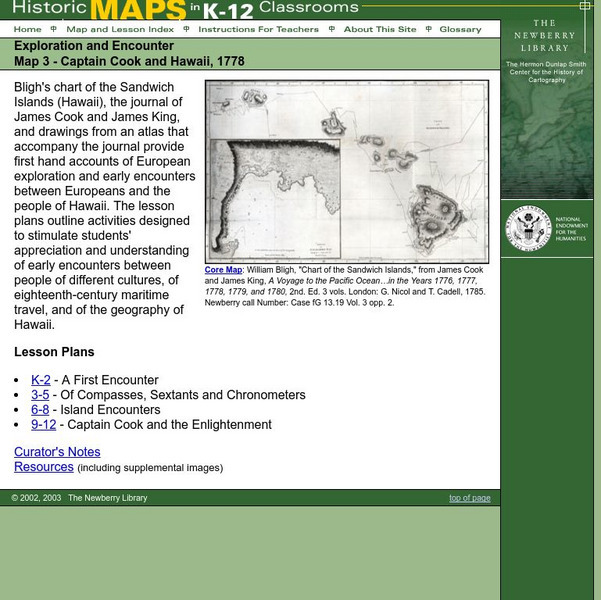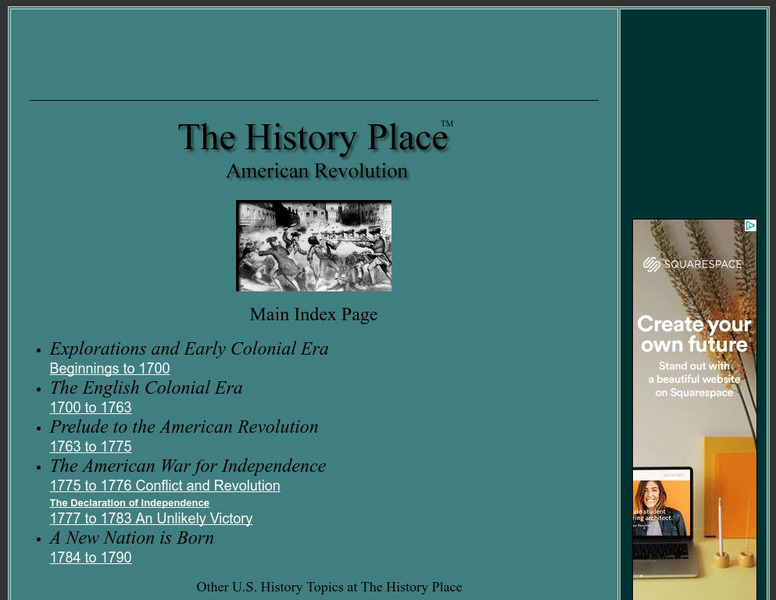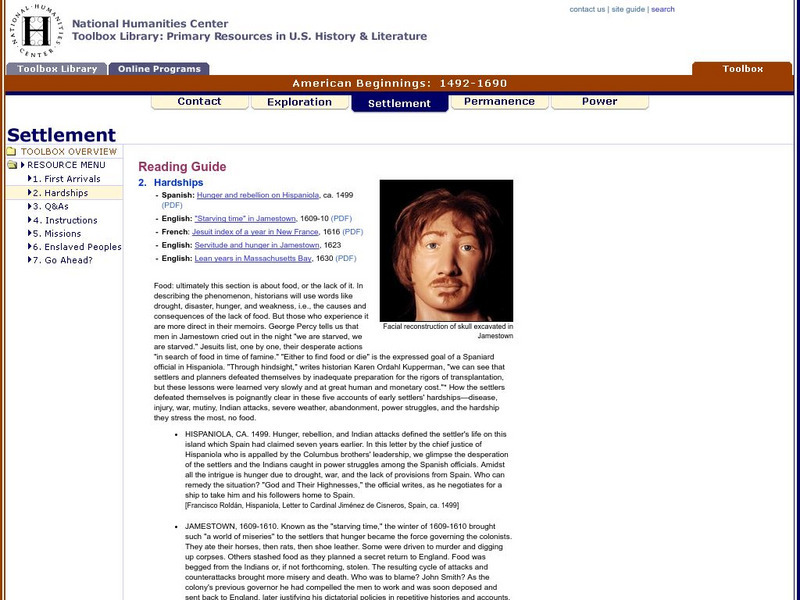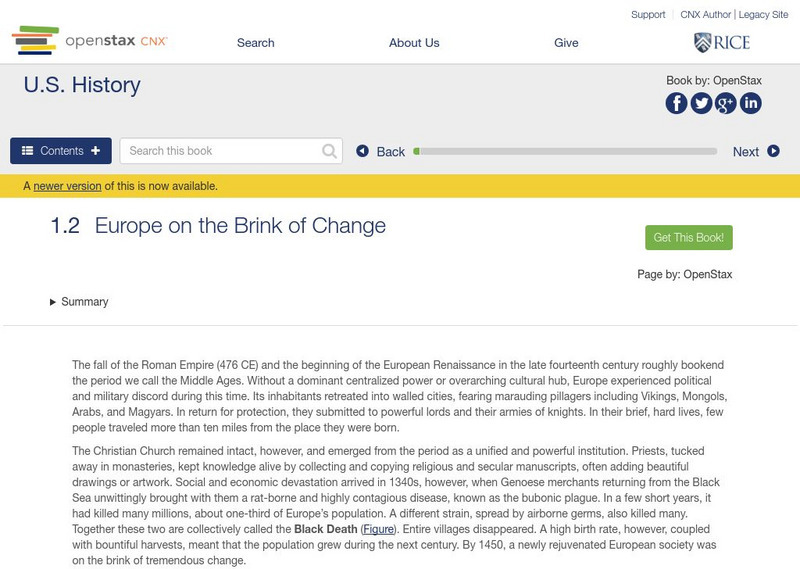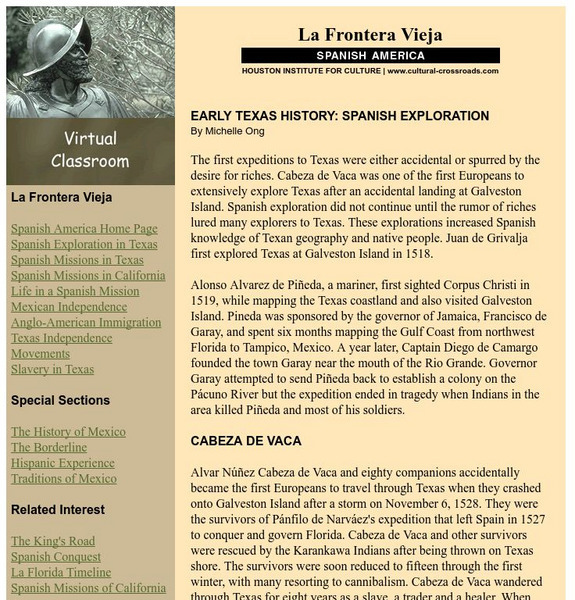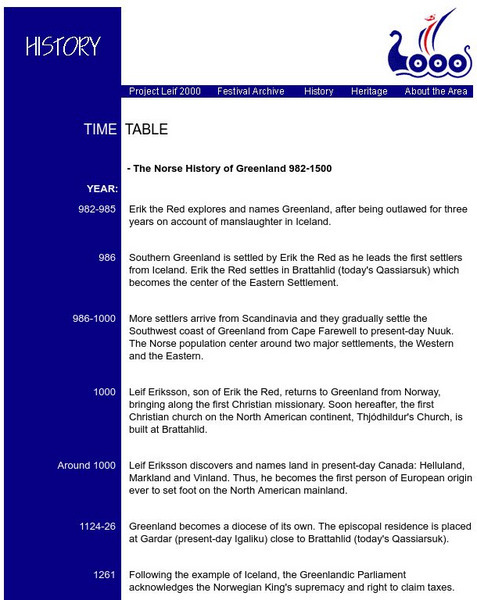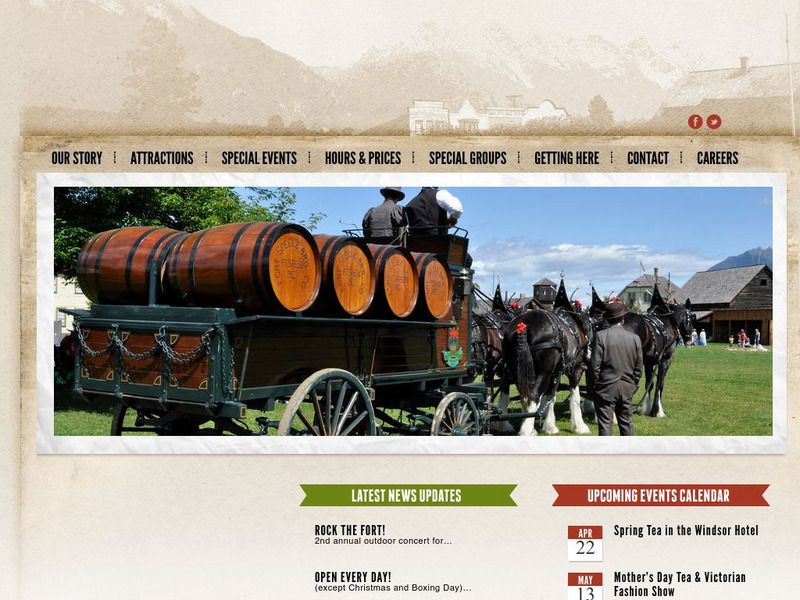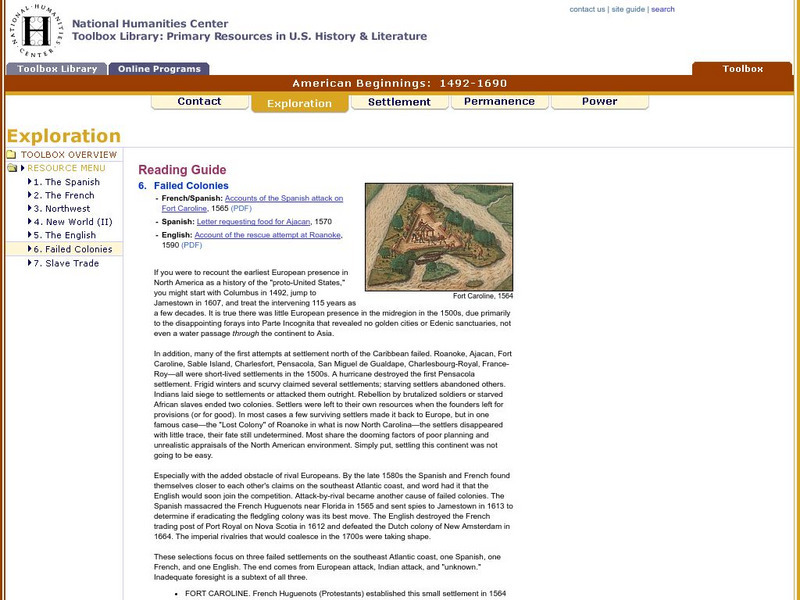Mariners' Museum and Park
Mariners' Museum: The Ages of Exploration: Age of Discovery
This Age of Discovery page presents naval artifacts and explorers of the 15th century to the early 17th century. It looks at European explorers who journeyed to North and South America, the search for the Northwest Passage, and...
PBS
Pbs Learning Media: Primary Source Set: Exploration of the Americas
This collection uses primary sources to explain the early exploration of the Americas.
British Library
British Library:northwest Passage: Early Approaches, a Historical Account
Read about the early attempts to find a way through the Northwest Passage. Included are portraits and early maps of the explorers.
Other
Radford University: Prelude to European Settlement of Virginia
This site traces the early voyages of explorers from Portugal and Spain who were trying to find new resources.
University of Calgary
European Voyages of Exploration: Geography and Cartography
This site provides information on mapmaking and cartograohy of the early explorers. Includes pictures of maps.
University of Groningen
American History: Outlines: The First Europeans
The first Europeans to arrive in North America -- at least the first for whom there is solid evidence -- were Norse, traveling west from Greenland, where Erik the Red had founded a settlement around the year 985. In 1001 his son Leif is...
State Library of North Carolina
N Cpedia: John W. Kinchelo, Iii: American Indians at European Contact
Native Americans inhabited the New World long before European explorers began establishing settlements on the land. This entry addresses the challenges the natives had to face upon Europe's arrival, trials in relationships, and how...
University of Groningen
American History: Outlines: Early Settlements
The early 1600s saw the beginning of a great tide of emigration from Europe to North America. Spanning more than three centuries, this movement grew from a trickle of a few hundred English colonists to a flood of millions of newcomers....
University of Groningen
American History: Outlines: The First Europeans
The first Europeans to arrive in North America -- at least the first for whom there is solid evidence -- were Norse, traveling west from Greenland, where Erik the Red had founded a settlement around the year 985. In 1001 his son Leif is...
National Humanities Center
National Humanities Center: America in Class: Early Visual Representations of the New World
A lesson that examines how Native Americans were portrayed by artists in the sixteenth century, whose aim was to convey their appearance to a European audience, and thereby encourage investment in future New World explorations. By...
McGraw Hill
Mc Graw Hill Higher Education: Old World, New Worlds
This article from McGraw-Hill Higher Education discusses European exploration in the late 1400s and 1500s and its impact on English colonization hundreds of years later.
The Newberry Library
Newberry: Exploration and Encounter: Map 3, Captain Cook and Hawaii, 1778
Map and primary source information provide first-hand account of exploration and encounters between Europeans and Hawaiians. Includes lesson plans for k-12, links to reference material and supplemental resources, and curators notes.
The History Place
The History Place: American Revolution
The History Place provides this timeline broken into six different sections that highlight the important events from the early European exploration of America through to the United States becoming a country. Features include informative...
National Humanities Center
National Humanities Center: Toolbox Library: Hardships, American Beginnings: 1492 1690
Three English, a French, and a Spanish primary account of the staggering losses, misery, and deprivation that characterized early European settlement as well as the resilience needed to overcome those challenges.
OpenStax
Open Stax: Europe on the Brink of Change
From a chapter on "The Americas, Europe, and Africa Before 1492," this section describes the European societies that engaged in conversion, conquest, and commerce and discusses the motives for and mechanisms of early European exploration.
Other
Houston Institute for Culture: Early Texas History: Spanish Exploration
Read about Cabeza de Vaca, one of the first Europeans to extensively explore Texas after an accidental landing at Galveston Island.
Khan Academy
Khan Academy: French and Dutch Exploration in the New World
An overview of the French, Dutch, and English explorers in the late 1500's and early 1600's.
Library of Congress
Loc: Exploring the Early Americas: Competition for Empire
Part of a larger site, the primary sources here deal with the competition among the European countries in establishing a foothold in the New World.
University of Groningen
American History: Outlines: The Literature of Exploration
Had history taken a different turn, the United States easily could have been a part of the great Spanish or French overseas empires. Its present inhabitants might speak Spanish and form one nation with Mexico, or speak French and be...
Other
The Norse Settlers in the New World
Features a time line of the events of the Viking voyages to Canada. Identifies different events that occurred during this time period of early Viking exploration.
Other
An Exploration of Historic Prejudice: The Italians
Some Italians came to British Columbia during the gold rush and the building of the CPR. They began to arrive in earnest beginning in 1898 to build the B.C. Southern Railway. They suffered from prejudice from English-speaking Europeans....
Curated OER
Etc: Early Discoveries and Explorations, 1497 1621
A map of the eastern coast of North America showing early European exploration from the voyages of Cabot (1497 and 1498) to the founding of New Netherlands in 1621. The map shows voyage routes, coastal features, rivers, and settlements...
PBS
Empire of the Bay: Sir Martin Frobisher
Read through the biography of Martin Frobisher to find out his importance in Canadian history.
National Humanities Center
National Humanities Center: Toolbox Library: Failed Colonies, American Beginnings: 1492 1690
Three European accounts of the disappointments, challenges, and outright failures to establish early successful colonial outposts in North America.





